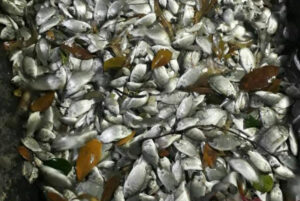 Time to solve invasion of invasive blackchin tilapia fish in Thailand’s waters
Time to solve invasion of invasive blackchin tilapia fish in Thailand’s waters
BANGKOK POST EDITORIAL
The invasion of blackchin tilapia — an alien fish species banned in Thailand — speaks volumes about a lack of protection of biodiversity, which negatively impacts the local fishery business.
Department of Fisheries (DoF) on Wednesday, during a press conference, said that the invasive species can now be found in local freshwater in 16 provinces and in the sea.
Local fishermen in Amphawa district in Samut Songkram first spotted the alien species in public in 2012, complaining that the fish are replacing local ones and eating shrimps at various aquatic farms.
Since then, barely anything has been done, and if the trend continues, even school children will wonder what has been done in the past decade to address the invasive species problem.
What the public learned from the DoF briefing is that it has not done much to address the problem.
DoF Buncha Sukkaew said that blackchin tilapia were once imported into the country for scientific research.
In 2010, the department allowed CP Foods (CPF) to import about 2,000 blackchin tilapia for its breeding centre in Amphawa district in Samut Songkhram province.
Mr Buncha admitted that officials only inspected the site once to survey a landfill where the 2,000 blackchin tilapia were buried after the study ended in 2010.
There had been no site inspection or regular monitoring before or after the study, Mr Buncha said.
Mr Buncha also insisted that the company did not send a report about the fish disposal nor samples of 50 dead fish as proof to the DoF.
However, CPF CEO Prasit Boondoungprasert this week said that the company did send the samples to the department as required.
He denied any company wrongdoing in the disposal of the fish and said those alien fish found in public must have been brought in as ornamental fish by others before they spread.
It now seems like the facts have been distorted, so the truth must be found.
Parliament and the government must launch a fair and transparent probe to get to the bottom of the issue.
The probe team must be chaired by neutral experts, conservationists and representatives of affected fishermen — not just government officials and company people.
As such, the DoF and CPF must assist in the fact-finding work.
CPF, as part of agro titan Charoen Pokphand, can contribute to the investigation by digging into its past records on this project.
Information on the genetics of the fish and other related data, especially communication records with the DoF, can help clear the air.
The inquiry must also investigate recent reports that the DoF allegedly approved the export of this banned species to 17 countries from 2013 to 2016.
It is good news that the National Center for Genetic Engineering and Biotechnology is offering to help with fish DNA testing to determine whether they come from the batch of fish CPF claimed to have killed and buried in 2010.
Make no mistake, the probe should not be a fault-finding mission. It should aim to revamp the country’s biosafety controls.
However, without clear information, the real culprit behind the blackchin tilapia spread will be spared from bearing responsibility.
BANGKOK POST EDITORIAL
These editorials represent Bangkok Post thoughts about current issues and situations.
Email : anchaleek@bangkokpost.co.th
Source: https://www.bangkokpost.com/opinion/opinion/2832073/time-to-solve-fish-invasion.


